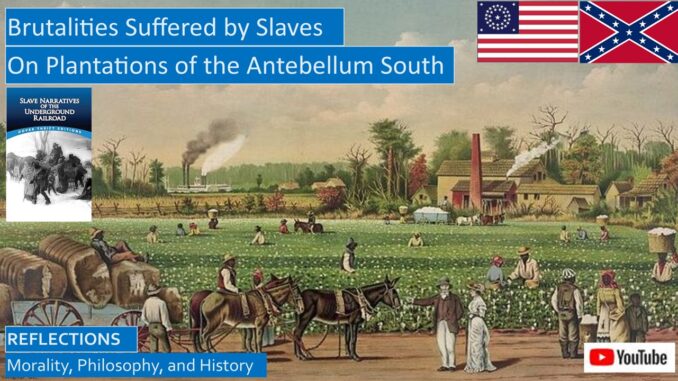
In all systems of slavery, ancient and modern, slaves were seen as property, which meant that masters had great discretion in how they treated their slaves. Masters could sexually abuse their slaves; this was a problem both in the ancient world and the Antebellum South. Two early black leaders, Frederick Douglass and Booker T Washington, both had white fathers, but they did not know who they were.
YouTube video for this blog: https://youtu.be/-DFtP8qXIe0
Iliad Blog 2, Captured Concubines in the Iliad and the Torah
http://www.seekingvirtueandwisdom.com/iliad_blog02/
The Iliad, blog 4, Briseis, Chryseis, Aren’t all Concubines the Same?
http://www.seekingvirtueandwisdom.com/the-iliad-blog-4-briseis-chryseis-arent-all-concubines-the-same/
Concubines in the Iliad, Old Testament and Christian Tradition
https://youtu.be/bGHHD7XTvr0
Ancient Warrior Societies, Blog 1, The Warrior Ethos of Ancient Greece, Rome, and Israel
https://seekingvirtueandwisdom.com/ancient-warrior-societies-blog-1-the-warrior-ethos-of-ancient-greece/
Ancient Warrior Culture, Concubines, and Slaves, Ancient Greece, Rome, and Israel
https://youtu.be/7QAZ_s6zw4E
Frederick Douglass Tells Us About His Life as a Slave in his Autobiography
http://www.seekingvirtueandwisdom.com/frederick-douglass-tells-us-about-his-life-as-a-slave-in-his-autobiography/
https://youtu.be/7VkzhyNnuQk
Up From Slavery: Autobiography of Booker T Washington
http://www.seekingvirtueandwisdom.com/up-from-slavery-autobiography-of-booker-t-washington/
https://youtu.be/yxDnJ6sBoJc
MASTER JOSHUA AND HIS THREE SLAVE WIVES
In our first story James, who flees slavery, tells us how his master Joshua had three common law slave wives. Since we found no pictures or illustrations of the slaves in our stories, we will use other period pictures in this reflection.
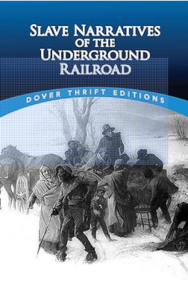
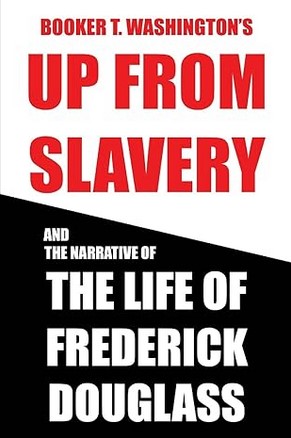
William Still, the narrator, tells us that “James was a tiller of the soil under the yoke of Joshua Hitch, who lived on a farm about seventeen miles from Baltimore. James spoke rather favorably of him; indeed, it was through a direct act of kindness on the part of his master that he was able to escape.” The sheriff had been visiting their house, and James was wondering if this meant that they might soon be sold. His master “owned three other adult slaves besides James, and they were females. One of them was his chief housekeeper, and with them all his social relations were of such a nature as to lead James and others to think and say that they were all his wives.” Joshua was quite fond of the two sisters, though he felt he may need to sell the third female slave.
Joshua trusted James to travel to Baltimore to find a kind master, but James instead traveled to Philadelphia, Pennsylvania, where he contacted the abolitionist Vigilance Committee, who helped him to travel to Canada on the Underground Railroad network.
“James was thirty-one years of age, rather a fine-looking man, of a chestnut color, and quite intelligent. He had been a married man, but for two years before his escape, he had been a widower, as his wife had been sold away from him to North Carolina.” “He had received only three letters from her; he had given up all hope of ever seeing her again. He had two little boys living in Baltimore, whom he was obligated to leave. Their names were Edward and William. What became of them afterward was never known,” though they suspected that all had been sold to settle the master’s debts.[1]
BRUTALITIES OF SLAVERY ON ALABAMA PLANTATIONS
In most systems of slavery, in both the ancient world and the Antebellum South, masters could beat, maim, and even murder their slaves, since slaves were property. However, abuse of slaves eased somewhat under the influence of the Stoic Philosophers and early Church Fathers. But it was common, in the Antebellum South, for masters to abuse their slaves, though they rarely killed them, since they were valuable property. But no mercy was shown to slaves who were brutally whipped by their masters, which Frederick Douglass often witnessed. No mercy was shown to suffering slaves in the Antebellum South.
Teachings about Slavery in the Bible, the Stoics, and by the Early Church Fathers
http://www.seekingvirtueandwisdom.com/teachings-about-slavery-in-the-bible-and-by-the-early-church-fathers/
https://youtu.be/poyvJajCXnE
Philip Younger remembers, “I served in slavery for fifty-five years, and am now nearly seventy-two years old. I was born in Virginia, and went, at ten, to Tennessee, at twelve, to Alabama, serving as the body servant of a military man. My treatment was sometimes rough, sometimes good. Many awful scenes I have seen while moving about. I have had to put chains on men, myself, to go into a chain gang. I have seen men whipped to death; I have seen them die. I have ridden hundreds of miles in Alabama and have heard the whip going from farm to farm while they were weighing out cotton.”
“In Alabama, the patrols go out in companies at about dark, and ride nearly all night. If they meet a colored man without a pass, it is thirty-nine lashes; but they don’t stop for the law, and if they tie a man up, he is very well off if he gets only two hundred lashes.”
“As a general rule, the treatment on Alabama plantations is very hard. Once in a while a man is kind, as kindness is out there, and then he is hated by all the other masters. They say, ‘his niggers spoil our niggers.’”
“There was a free man in Huntsville, a barber, whose wife, a free woman, was taken by a patrol, as she was walking out at dark, and put in jail, just to disgrace her.” “Her husband grumbled about it, a rumpus was made, and people collected in front of the tavern door. The folks then called out, ‘Shoot the damned nigger!’ The patrol stabbed him with a bowie knife, and he fell in the street. He was carried in, and a doctor dressed the wound, but he was never a sound man afterward.”
“I hired my time and made some money. I bought my wife’s freedom first, and sent her away. I got off by skill.” “Escape from Alabama is almost impossible. If a man escapes, it is by the skin of his teeth.” “I have children and grandchildren in slavery.”
Philip escaped to the Northern states, but after the passage of the Fugitive Slave Law of 1850, he fled to Ontario, Canada. Talking about his new home, he said, “I had rather starve to death here, being a free man, than to have plenty in slavery. I cannot be a slave anymore, nobody could hold me as a slave now, except in irons.” “Old as I am, I would rather die at the point of a sword than go into slavery.”[2]
DESPERATE BLOODY STRUGGLE BETWEEN SLAVE AND MASTER
There was considerable abuse of slaves on the vast cotton plantations of Alabama and Mississippi. It was a miracle that young Theophilus not only survived a brutal beating and knife attack from his cruel master, but also his trek to freedom.
“Theophilus is twenty-four years of age, dark, height and stature hardly medium.” “His bearing is subdued and modest, yet he is not lacking in earnestness.”
Says Theophilus: “I was in servitude under a man named Houston, near Lewes, Delaware. He was a very mean man, he didn’t allow you enough to eat, nor enough clothes to wear, he never allowed a drop of tea, or coffee, or sugar, and if you didn’t eat your breakfast before day broke he wouldn’t allow you any.”
“He had a wife meaner than he was. Four years ago, my master cut my entrails out for going to a meeting at Danel Wesley’s church one Sabbath night.” “Monday morning he called me up to whip me; called me into his dining room, locked the doors, and then ordered me to pull off my shirt.”
“I told him: NO, sir, I wouldn’t.” “He tore my shirt off, after I would not pull it off, and he ordered me to cross my hands. I didn’t do that.” After that, he “got his gun and broke the breech over my head. He then seized the fire tongs and struck me over the head.” Then “he took the parlor shovel and he beat that on me till he broke the handle.” “I told him I was bound to come out of that room.”
“He run up to the door and drawed his knife and told me if I ventured to the door, he would stab me.” “I aimed straight for the door; but before I reached it he stabbed me, drawing the knife as hard as he could rip across my stomach, and right away he began stabbing me about my head.” After a desperate struggle, Theophilus succeeded in getting out of the building.
Theophilus continues, “I started at once for Georgetown, carrying a part of my entrails in my hands for the whole journey, sixteen miles. I went to my young masters, and they took me to an old colored woman called Judah Smith, and for five days and nights I was under treatment” of three doctors. “I was not expected to live for a long time, but the Doctors cured me at last.”[3]
The title of this story states that Theophilus arrived from Delaware in 1858, but the excerpt only describes his maltreatment and not how he lived to tell his story to abolitionists.
DISCUSSING THE SOURCES
Most of the accounts in this Dover collection of Slave Narratives of the Underground Railroad describe how slaves escaped to freedom, and what their lives were like as slaves in the Antebellum South. Many of these narratives were recorded by William Still, a free black abolitionist. His father had bought his freedom in 1798 in Maryland, moving north to New Jersey. His mother escaped from slavery in Maryland twice. William was the youngest of fourteen children, and was active in the abolitionist Vigilance Committee, assisting as a conductor of the Underground Railroad to guide up to eight hundred runaway slaves to freedom.[4]
In our first video in our series of slave narratives, Harriet Jacobs sailed for freedom after hiding for many years on her plantation.
Underground Railroad: Harriet Jacobs, the Slave Girl Who Escapes Slavery Before the Civil War
https://seekingvirtueandwisdom.com/underground-railroad-harriet-jacobs-the-slave-girl-who-escapes-slavery-before-the-civil-war/
https://youtu.be/3KMkAyg7goY
We read of Eliza Harris who escaped with her infant daughter crawling from one block of ice to another, inspiring a scene in Harriet Beecher Stowe’s Uncle Tom’s Cabin, a novel that helped spark the Civil War.
Underground Railroad: Eliza and Her Infant Escape Slavery Over the Ice Before the Civil War
https://seekingvirtueandwisdom.com/eliza-harris-and-her-infant-escapes-slavery-over-the-ice/
https://youtu.be/kRSzNZP73og
Harriet Tubman was perhaps the most famous conductor on the Underground Railroad, she returned to Maryland nineteen times to lead family members and other slaves to freedom, and even assisted in a military raid in South Carolina during the Civil War.
Harriet Tubman, Conductor of Underground Railroad, Leading Many Slaves to Freedom
https://seekingvirtueandwisdom.com/harriet-tubman-conductor-of-underground-railroad-leading-many-slaves-to-freedom/
https://youtu.be/Lkk30_zIDI0
We reflect on the amusing story of Henry Box Brown, who had himself boxed up and shipped to freedom in Philadelphia.
Underground Railroad: Henry Box Brown, Who Escaped From Slavery Via Mail Express
https://seekingvirtueandwisdom.com/underground-railroad-henry-box-brown-who-escaped-from-slavery-via-mail-express/
https://youtu.be/q3AWLDo4e6I
The pale slave Ellen Craft impersonated a disabled white man whose trusty servant, who was really her husband, assisted her in their train ride to freedom.
Fleeing Female Slave Impersonates Planter, Husband Posing As Trusty Servant: William & Ellen Craft
https://seekingvirtueandwisdom.com/fleeing-female-slave-impersonates-planter-husband-posing-as-trusty-servant-william-ellen-craft/
https://youtu.be/VEggppALPLE
Some slaves did have kind masters, such as Arnold Gragston, who was one of the few slave conductors on the Underground Railroad, as his master did not ask too many questions about his frequent absences.
Arnold Gragston: Slave Conductor on the Underground Railroad Assists Runaway Slaves
https://seekingvirtueandwisdom.com/arnold-gragston-slave-conductor-on-the-underground-railroad-assists-runaway-slaves/
https://youtu.be/GuVlVqCYJZQ
We have the proud slave Margaret, who fled with her infant to freedom to escape slavery and a brutal whipping, with help from Watch, her mastiff, who saved her life.
Margaret Fleeing to Freedom With Help From Watch, Her Mastiff, and Epictetus on True Freedom
https://seekingvirtueandwisdom.com/margaret-fleeing-to-freedom-with-help-from-watch-her-mastiff-and-epictetus-on-true-freedom/
https://youtu.be/dw127D8b1gk
The tragic story of Margaret Garner, the slave mother who killed her daughter rather than doom it to a life of sexual exploitation as a slave, was the inspiration for the main character in Toni Morrison’s novel, Beloved.
Margaret Garner, Slave Mother Who Killed Her Child to Avoid Slavery, Inspiration for Beloved
https://seekingvirtueandwisdom.com/margaret-garner-slave-mother-who-killed-her-child-to-avoid-slavery-inspiration-for-beloved/
https://youtu.be/gd6SRd7T20I
[1] William Still, Jamie Griffin, alias Thomas Brown, Slave Holder in Maryland with Three Colored Wives, included in Slave Narratives of the Underground Railroad (Garden City, New York, Dover Publications, 2001, 1872), pp. 82-84.
[2] Benjamin Drew, Philip Younger, Escape from Alabama Is Almost Impossible, included in Slave Narratives of the Underground Railroad, pp. 191-193.
[3] William Still, Theophilus Collins, Desperate Bloody Struggle, included in Slave Narratives of the Underground Railroad, pp. 19-21.

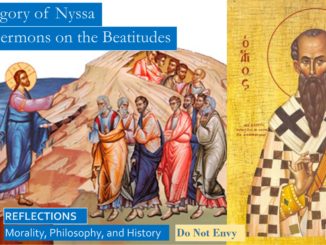
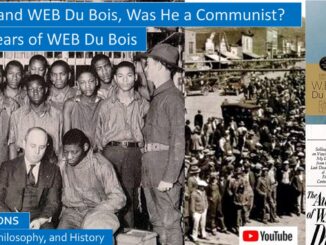
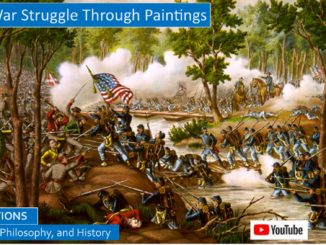
Be the first to comment